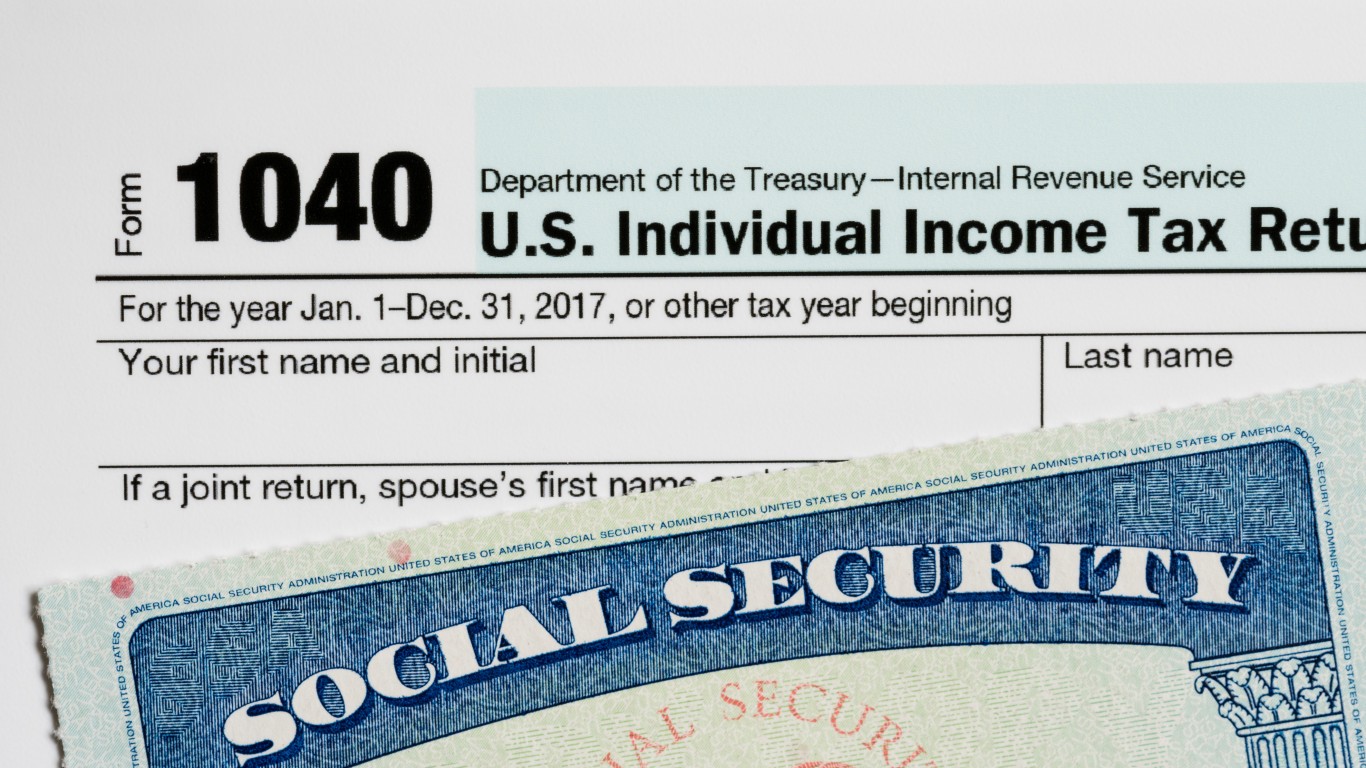Personal Finance
The Average American Can’t Answer These Simple Social Security Questions

Published:

Considering the importance of Social Security, it begs the question of how much people know about this government program. As the single largest aspect of the federal budget every year, Social Security is something millions rely on to enjoy a better life after retirement. Similarly, Social Security is a beneficial tool that helps lift millions of Americans above the poverty line, so the benefits are extensive.
This level of understanding makes you wonder why the average American cannot answer some simple questions about this life-changing program. While it’s common to associate Social Security with retirement, there is much more to this program than just providing retirement income for the 68 million people receiving a check from it in 2024, including things like what happens when one spouse passes away.

What is the Social Security program in the United States?

For most people, the Social Security program should be understood as a part of the federal budget that provides individuals who have enrolled in the program by paying taxes with a source of income either during retirement as a result of a disability.

What is the age at which you are eligible for Social Security benefits?

The quick and short answer is that most people are eligible starting at age 62, though the benefit amount is reduced. Most people will likely begin to take benefits between 65 and 70, when the benefit amounts are higher, providing an improved way of life.

When is the best time to take Social Security benefits?

You will earn the maximum benefit if you can hold off until 70, so this is the ideal age to wait until. However, the opposite is also true, as you will earn less money if you start taking benefits earlier when you turn 62. Should you not immediately need the income, holding off until 70 (or close to) can help you earn significantly more.

Can you stop Social Security once you start?

Suppose you find yourself in a situation where you want to stop receiving Social Security benefits. You can, albeit with some caveats. This scenario might happen if you decide to claim your benefits too early, so the options available depend on age and whether or not you’d need to repay benefits and then reapply.

What is your maximum payment if you draw Social Security at 62, 65, and 70?

It’s important to note that these amounts can and will change in 2025, but in 2024, if you retire at 62, your maximum Social Security benefit will be $2,710 monthly. At 65, also known as the Full Retirement Age, it’s $3,822 monthly. However, at 70, your maximum Social Security benefit would be $4,873 monthly.

What happens to Social Security benefits if you also begin drawing unemployment benefits?

If you have to draw unemployment benefits due to a job reduction, it will not affect your retirement benefits from the Social Security program. However, knowing that unemployment doesn’t count as earnings is essential. Because of this, if you’re drawing Social Security, receiving unemployment could reduce your total payment depending on how long it takes to find a new job.

How much do you pay into Social Security while working?

All Americans will pay approximately 6.2% of their wages into the Social Security program, up to $168,600 of their income earnings. Any income above this dollar amount will not count against Social Security taxes. Employers will also contribute 6.2%, while people considered self-employed pay both sides for a total of 12.4% into the Social Security fund.

How much will you individually receive from the Social Security program?

The formula to determine how much you will earn from Social Security is complicated, but it’s essentially the average income from your 35 highest-earning years. Once this number is calculated, the amount varies based on when you draw Social Security between 62 and 70.

How do you apply for Social Security benefits?

For most people, the best way to apply for Social Security benefits is at a local Social Security office. You can also apply by phone (1-800-772-1213) or online. Applicants require a birth certificate and a completed Social Security Form SSA-1, and the application should be filed at least four months before wanting to claim benefits.

Are Social Security benefits taxable?

In most cases, up to 85% of benefits will be subject to a federal income tax, depending on if your income exceeds a certain threshold. If it does, any individual with combined income (adjusted gross income + half of Social Security benefits) over $25,000 or couples over $32,000 would be subject to taxation. State taxes may also apply to Social Security in Colorado, Vermont, and 11 other states.

How much do you need to earn to qualify for Social Security benefits?

You must earn at least 40 credits, equivalent to 10 years of employment, to receive Social Security benefits. In 2024, one credit is received for every $1,640 of income and you can earn up to four credits annually. Even part-time workers qualify for Social Security benefits if they reach the same 40-credit threshold.

Does the Social Security program apply any cost-of-living increases annually?

A Social Security cost-of-living adjustment is applied annually and is generally based on inflation. In addition, if you are working while receiving benefits and earn more than your lowest-earning years of the 35-year average, you can receive a higher monthly payout if applicable.

Will Social Security benefits be passed onto heirs upon someone’s death?

If a current Social Security recipient dies while receiving benefits, their heirs will not receive any funds. Instead, the remaining amount the recipient would have received is placed back into the Social Security fund to benefit other beneficiaries in the program.

How does the Social Security spousal benefit work?

Should you have a spouse who receives Social Security, a spouse can claim benefits regardless of whether or not they have held a job. To qualify, the spouse with a work history must have received retirement benefits and be at least 62. Assuming these requirements are met, a spousal can receive up to 50% of their partner’s retirement amount.

What happens if a spouse receiving Social Security benefits dies?

If a non-working spouse has a working spouse partner who passed away, the surviving spouse is eligible for up to 100% of their partner’s full Social Security benefits. However, there are some requirements: the surviving spouse must be at least 60 years of age; otherwise, the amount could be reduced by as much as 32.5% if a claim is made before turning 60.

Will the Social Security fund still be around when you retire?

Although Social Security is a hotly contested topic in political circles, there is a reasonable likelihood that the program will still be around when you retire. However, Social Security is not guaranteed, and no specific law or body says the program cannot go away. The good news is that as long as people pay their taxes, the program can be funded, which is a definite positive in considering whether it will continue to exist for another few decades.

Will Social Security be enough to provide for a full retirement?

While Social Security will help with the cost of living in your retirement years, having multiple income streams is more essential than ever. This could include but is not limited to a 401K from your employer, an IRA for retirement investments, and other investments and savings that can be used to help better enjoy the golden years without working.

How does inflation affect Social Security benefits?

In 2024, the cost-of-living adjustment, or COLA, was calculated annually based on the Consumer Price Index for Urban Wage Earners and Clerical Workers. Based on the calculations, Social Security program beneficiaries received a 3.2% cost-of-living increase, which helped ensure their purchasing power parity with rising costs.

Can you receive Social Security benefits if you move to another country?

Most importantly, you can receive your Social Security benefits even if you change your permanent residence to another country. However, this is with restrictions, as countries like North Korea and Cuba, which the United States does not recognize, would not allow you to collect such benefits. It’s also important to know that international tax rules apply to any income gained from Social Security benefits.

How does divorce impact Social Security survivor benefits?

If you were married to your working ex-spouse for at least 10 years before divorce, you may be eligible for benefits should this ex-spouse pass away. In addition to this benefit, if you remarry after 60, you can still collect benefits based on your previous spouse’s working record.

What happens if you receive an overpayment from the Social Security program?

Rest assured the Social Security program will claw this money back if you receive any type of overpayment. Depending on the overpayment amount, they may reduce a future benefit, request a repayment, or negotiate a repayment plan to recoup the money.
Are you ahead, or behind on retirement? For families with more than $500,000 saved for retirement, finding a financial advisor who puts your interest first can be the difference, and today it’s easier than ever. SmartAsset’s free tool matches you with up to three fiduciary financial advisors who serve your area in minutes. Each advisor has been carefully vetted and must act in your best interests. Start your search now.
If you’ve saved and built a substantial nest egg for you and your family, don’t delay; get started right here and help your retirement dreams become a retirement reality.
Thank you for reading! Have some feedback for us?
Contact the 24/7 Wall St. editorial team.